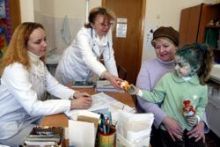In the past year the Crimea ranked among the top Ukrainian regions for implementing family practice with its 156 institutions of family practice, some 280 general practitioners, and over 300 paramedics.
The implementation of the new healthcare system was made possible owing to the international and regional programs in the Crimea run by the EU, the Verkhovna Rada of Ukraine, and the Crimea’s Council of Ministers. “The first raion [to implement family practice] was Saky,” says Serhii Donych, the Crimea’s Minister of Healthcare. “Within a year the medical personnel of this raion built a contemporary model of family practice and learned to work in the new conditions.”
In Saky raion alone 12 family outpatient clinics and over 30 rural health posts were opened. Now family doctors cater to nearly 90 percent of patients on a day-to-day basis.
The teachers at the Department of Family Practice in the Crimea State Medical University offered training courses to pediatricians and primary care physicians in the area of family practice. The Ministry of Healthcare gave Saky raion 331,000 hryvnias’ worth of equipment for three outpatient clinics and 12 health posts. Vehicles were purchased for family doctors in rural areas. In the first year of the project the EU financed the installation of computer equipment and several diagnostic facilities and the creation of four modern dentist offices and labs for family clinics.
Another contributing factor has been the program “Crimeans’ Health,” which attracted funds from the republican budget. This made it possible to raise salaries, bonuses, and fringe benefits for doctors in rural areas and carry out a series of free-of-charge diagnostic tests. Starting from Jan. 1, 2009, the staff of raion hospitals and outpatient clinics in cities and urban villages will be paid more. Also, free mammographic tests will be offered to the populace.
However, the process of introducing family practice in the Crimea is not over yet and will demand substantial financing. Anatolii Hrytsenko, Head of the Supreme Council of the Crimea, said that an extra 300 million hryvnias have been allocated to finance the healthcare sector on the peninsula. The Crimea’s medical personnel supports the passage of the Law of Ukraine “On Healthcare” that would regulate the relationships between the healthcare sector and patients in today’s economic conditions. Vasyl Kniazevych, Minister of Public Health of Ukraine, said that at present the healthcare sector needs to declare a program of reforms in its institutions. One of the directions for these reforms will be the implementation of family practice and the creation of regional medical programs following the Crimean experience.
COMMENTARIES
Liubov KHAN, head of a family practice clinic attached to City Hospital No. 7 in Simferopol:
“Family practice clinics have helped reduce disease incidence among children and adults in the city districts. General practitioners are well-placed to track their patients’ risks and forestall diseases. The residents of our district speak highly of our general practitioners. However, our clinic need more modern equipment. We need to have a dentist and a gynecologist, and this requires special equipment. Therefore, in cases with children we are forced to refer them to the children’s hospital for medical advice and to City Clinic No. 7 and its labs for checkups. Nevertheless, our clinic and its family doctors are successful in fulfilling their main function-monitoring the condition of whole families.”
Halyna LAPINA, senior physician for outpatient services at City Hospital No. 7, Simferopol:
“Family practice clinics appeared in Simferopol in late 2004, primarily in remote districts. Today there are six family-practice districts in the area of Balaklavska St. and three more near the village of Ak-Mechet.
“General practitioners in Simferopol are doctors who can treat the widest range of medical problems and have professional knowledge of children’s diseases, the fundamentals of gerontology, and the symptoms of all diseases. The key advantage of family practice is that the doctor knows the patient from birth and offers treatment based on the specific social, hereditary, and personal factors. This makes it possible to detect diseases at early stages and reduce the number of patients in need of hospital care. We need to foster and educate true intellectuals in doctors’ offices because general practitioners have an extremely large number of duties. The introduction of family doctors in rural areas is a justified and progressive step because many village doctors have been doing this work for a long time now. It also makes sense in large city districts.”
Iryna KLIARYTSKA, head of the Department of Therapy and Family Practice at the Crimea State Medical University:
“According to the Concept for the Development of Healthcare in Ukraine approved by the president the central figure of the new healthcare system is going to be the general practitioner. In the past several years 17 departments of family practice with 159 teachers have been opened in Ukraine. They have trained 4,685 doctors but only 2,852 are employed. The Heorhiievsky University started training general practitioners in two-year internship courses in 1999. Education in family practice is also offered by the departments of further education.
In the first five years we trained a mere 26 general practitioners. In 2000-01 we offered a six-month training program for rural doctors and trained 40 doctors with various areas of specialization (primary care doctors, pediatricians, and obstetricians-gynecologists). The International Organization for Migration commissioned us to train 12 doctors for working in the institutions where migrants facing deportation are kept.
We are now training family doctors for Saky raion following a contract with the EU. However, it is more effective to educate general practitioners in specialized departments. Therefore, in 2003 the Department of Therapy and Family Practice was opened in Simferopol, permitting an increase in the number of doctors at the department of internship and a wider training program for primary care physicians and pediatricians who work in rural areas. Over 150 general practitioners have already graduated from our department.”







